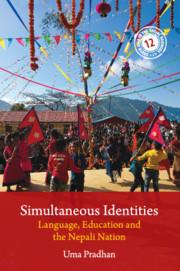‘Questions of language and schooling are central to most theories of nationalism and yet there have relatively few detailed ethnographies of nationalism or sub-nationalism in schools. In the Nepalese context there have been many studies of education and many studies of ethnicity, but until Uma Pradhan spent time in two schools that take pride in their mother-tongue teaching, no one had studied the interaction of ethnicity, language, cultural capital, public perceptions of quality, and pedagogy in actual practice. With this innovative and landmark monograph on multilingualism and schooling, we have, for the first time, a sophisticated and practice-focused ethnographic examination of cultural nationalism and multilingual education in Nepal as they are experienced, (re)produced, and resisted ‘at the coal face’, i.e. by the children receiving them and by the teachers, activists, and bureaucrats seeking to deliver and/or manage them.’
David N. Gellner - University of Oxford
‘Pradhan's book is a powerfully argued analysis of students', educators', and activists' uses of language to re-situate ethnic identities within discourses of Nepalese nationalism. Simultaneous Identities takes to new levels our understanding of the complex politics and everyday practices underlying the social production of ethnicity and nationalism.’
Amy Stambach - University of Wisconsin
‘This work on multilingual education is challenging both in theories and practices. With the deployment of extensive methodologies such as participant-observation, personal communications with teachers, parents and education officers including case studies of students of two mother-tongue schools of Nepal Bhasa in the city of Kathmandu and Dangaura Tharus in Kapilbastu, the outcomes address identity, language, education and nationalism of non-native speakers of Nepali, the national language. This exhaustive research work is the first of its kind on multilingual education after the constitution of Nepal in 1990 has declared primary schooling in mother-tongue is fundamental right. Hence, it makes a significant contribution to understanding learners from minority language communities are at education disadvantage, the benefits of MLE, and requirements for success and sustainability of MLE programmes.’
Nirmal Man Tuladhar - Social Science Baha, Nepal
‘In this ethnographically-rich and theoretically-sophisticated study, Pradhan explores the politicised and controversial issue of mother-tongue education in Nepal. Through a nuanced analysis of everyday language practices and discourses around language use in two mother-tongue schools, the author sheds light on the complex interplay between education, national identity, and ethnic identity in the fast-changing socio-political context of contemporary Nepal. This is an important and timely book that situates mother-tongue schools as spaces where social authority and power are negotiated.’
Mark Turin - University of British Columbia
‘With its focus on everyday politics of mother tongue education in Nepal, this book is an invaluable and timely contribution to the bourgeoning regional scholarship of educational ethnography in Nepal and to the wider field of educational anthropology. It opens up the realm of language use and exchange inside two minority language schools through rich ethnographic accounts and thereby makes a compelling case for understanding the relationship between education, power and language politics. The book is a must for anyone with an interest in education in Nepal, mother tongue education and linguistic hierarchies, and more broadly the intersection between educational and linguistic anthropology.’
Karen Valentin - Aarhus University, Denmark
‘… Simultaneous Identities is a well-written ethnography that … offers a fascinating read on ethnography and presents a rethinking of multiculturalism in the context of Nepal … it makes in-depth observations based on everyday detail and existing literatures, providing an analysis of nuanced relations among the agents of power from a cultural perspective … as it is written by an indigenous Newar researcher, the book provides an impressive reflection on the researcher’s position.’
Jingwei Li
Source: Journal of Contemporary Asia



